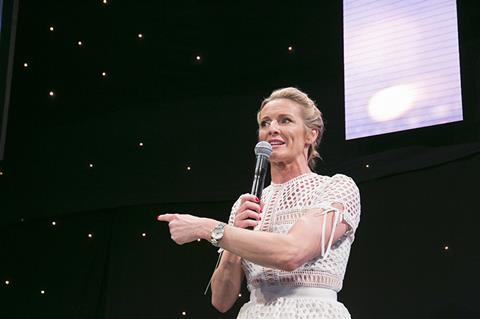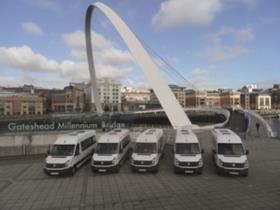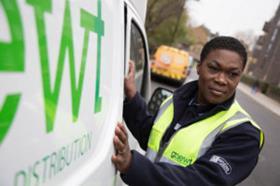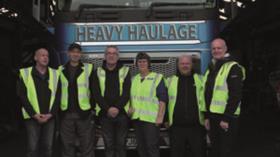
The winner of Fleet Van Operator of the Year, sponsored by Renault Trucks, will be revealed at the 2018 Motor Transport Awards on 4 July and sees Gateshead Council, Gnewt Cargo, Royal Mail and Rexel UK go head-to-head.


Gateshead Council has committed to improving all aspects of its fleet of 600 commercial vehicles, the majority of which are vans, with demonstrable KPIs to prove the success of its ongoing efforts, even in the face of tight council budgets. A combination of route optimisation, on-board weighing and use of driver tracking and driving systems has delivered Gateshead a 30% reduction in its fuel consumption. The council recently redesigned its fleet review processes, which it said extended the life of many of its vehicles. With a 100% MoT pass rate over the past 18 months, Gateshead continually meets its internal fleet availability target of 95%. Gateshead has also committed itself to reducing its carbon footprint, and has been a member of the Low Carbon Vehicle Partnership since its inception. The council now runs 10 electric Transit vans and 10 hybrid vehicles, as well as 12 electric Nissan vans.
Judges applauded Gateshead’s commitment to improving its environmental performance despite its budget restrictions. One said: “Driving down cost while driving up safety is a difficult thing to do, but Gateshead Council are achieving this. Their obvious excellent customer satisfaction and adoption of electric vehicles demonstrates their commitment to the local community.”

Gnewt Cargo has embraced the mayor of London Sadiq Khan’s drive to reduce air pollution in the city. It is working in conjunction with TfL’s LoCity incentive and the Office for Low Emission Vehicles to test a fleet of the latest electric vans on the market, while helping the rest of the industry by making the data from its trial available online. Specialising in last-mile deliveries, the two-year trial Gnewt Cargo has undertaken with Nissan Voltias and BD Auto e-Ducatos, in addition to its existing fleet of electric vehicles, is aimed at building a picture of the demands on the grid that a wider uptake of electric powered vehicles would make. The Voltias and Ducatos being trialled at present are larger than the average electric van, which in theory will reduce congestion as well as emissions, because fewer vehicles will be needed for the same number of deliveries.
Judges praised Gnewt Cargo for its innovative thinking and active approach to trying new technology. One said: “Gnewt have certainly proved to be highly effective as leading the way in clean energy transportation.”

Royal Mail runs the UK’s largest light van fleet in the UK, and the judges applauded it for recognising the social responsibility that goes hand in hand with this. With a vision of building a ‘zero-harm’ health and safety culture, drivers are subjected to on-road training and risk assessments before they are allowed to drive a Royal Mail van. In 2016/17, the operator provided more than 13,500 training courses to its van drivers. A focus on areas with high collision rates coupled with bespoke training courses for these locations led to a 49% reduction in collisions in start/stop operations. Royal Mail has also proven its commitment to social responsibility with the recent purchase of 100 Peugeot Partner vans, and its participation in a trial of nine brand new electric vans built by Arrival.
One judge remarked on Royal Mail’s handle on accident reduction regardless of its vast fleet size. Another added: “Royal Mail has shown that even for a large and unionised multi-site fleet, improvements can be instilled and made to work well to benefit all stakeholders. Safety and continuous training seem to be the cornerstones of this operator. This is how to do transport properly!”

Rexel UK made the shortlist of this year’s Fleet Van Operator of the Year award because of the improvements it has made to its fleet performance with a strong focus on driver training. The electricity provider runs 519 vehicles across a network of 17 hubs and 250 other locations and employs approximately 600 drivers. The business had not provided its drivers with formal transport training prior to 2012, but has since rolled out a two-year driver training programme delivered from an in-house team and FORS. In the past 18 months, Rexel has seen a 6.4% improvement in fuel economy across its fleet, and halved its speeding fines in the past year. It also saw a 47% year-on-year reduction in parking fines, and made CO2 savings of more than 600,000kg.
One judge said: “Rexel has shown that for limited cost on training and compliance, significant savings can be realised.” Another added: “This is clearly a business that is committed to continuous improvement in all it does. The focus on health and safety and driver training is clearly paying off with big reductions in fuel spend, driving incidents, insurance claims and driving convictions.”










